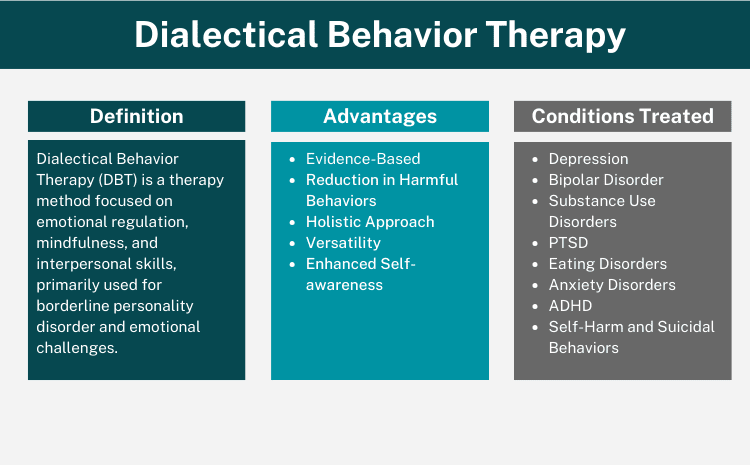If you have a mental health condition, it’s good to know that there are methods to help you. One of these methods is Dialectical Behavior Therapy (DBT), often used by therapists.
At Guided Grace Family and Youth Services, we offer DBT and other therapy services to help clients cope with negative situations and manage emotions independently.
In this blog, we’ll discuss DBT, how it works, and the conditions that can benefit from it.
What is Dialectical Behavior Therapy?
DBT is a type of therapy related to Cognitive Behavioral Therapy (CBT). Both help you understand how your thoughts, feelings, and actions are connected.
However, DBT focuses more on controlling your emotions, being mindful, and accepting difficult situations and pain. With DBT, you can learn skills to handle your emotions, accept your mental health condition, and avoid harmful behaviors.
DBT is often delivered in individual therapy sessions, but it may also include group therapy sessions where individuals can practice and reinforce their newly acquired skills.
How Does DBT Work?
Dialectical refers to the “existence of opposites.” Regarding DBT, you will learn how to balance opposites, namely acceptance and change.
During these sessions, your therapist will teach you how to accept your behaviors and experiences while trying to manage your emotions going forward.
DBT addresses self-destructive behaviors, such as self-harm or suicide attempts, as a primary concern.
Once these behaviors are effectively managed, the focus shifts to enhancing essential life skills, such as regulating emotions and improving communication.
As the program progresses, it builds upon this foundation, ultimately prioritizing improving relationships and self-esteem and encouraging social connections.
DBT centers on four core areas that aim to improve skills and coping abilities:
1. Distress Tolerance
This component teaches the skill of managing emotions and reactions independently, allowing you to experience feelings like anger without reacting impulsively.
Your skills therapist will show you how to cope during a crisis, especially when you have no control over the outcome. Furthermore, you’ll learn to accept a situation as is rather than how it should be.
2. Emotional Regulation
This involves effectively recognizing, identifying, controlling, and adapting your emotions. Your skills therapist will help you manage your emotions so they don’t control your thoughts and behaviors.
3. Mindfulness
It entails becoming more fully present in the moment, leading to heightened self-awareness and improved focus on the present.
You will learn to acknowledge your thoughts, feelings, and behaviors the moment they happen. You’ll also learn how to refrain from controlling them.
4. Interpersonal Effectiveness
This facet helps you acquire the skills to handle conflicts and appropriately navigate interpersonal interactions.
The intention is to help you to articulate your needs effectively. You’ll also learn to say no when necessary while maintaining your self-respect and relationships.
What Conditions Does DBT Treat?
People with Borderline Personality Disorder (BPD) usually benefit from DBT. They often have intense anger, sudden mood changes, and feel very sensitive to rejection.
DBT can also be helpful if you struggle with one or more of the following:
- Self-harm
- Suicidal thoughts
- Depression
- Anxiety
- Difficulty in managing intense emotions
- Bipolar Disorder
- Addiction and Eating Disorders
- Post-traumatic stress
What is the 24-hour Rule in DBT
The “24-Hour Rule” in DBT is a guideline for managing impulsive or emotional reactions.
It encourages you to delay impulsive actions or responses for a designated period, specifically 24 hours, before deciding or taking action in response to a situation.
Here’s how the 24-Hour Rule works:
- Triggering Event: When faced with a situation or trigger that elicits a strong emotional reaction, you are encouraged to pause and refrain from reacting immediately.
- Wait for 24 Hours: Instead of acting on the impulse, you commit to waiting for a full 24 hours before making a decision or taking any significant action related to the situation.
- Use DBT Skills: During this waiting period, you are encouraged to apply the DBT skills you’ve learned, such as mindfulness, emotion regulation, and distress tolerance.
- Consult with a Support System: Consult with a therapist or a trusted support person during this waiting period to discuss the situation, gain insight, and receive guidance on responding.
- Evaluate and Decide: After 24 hours, you can revisit the situation with a clearer mind and a better understanding of your emotions. You can then make a more thoughtful and considered decision about how to proceed.
Dialectical Behavior Therapy Available in Saginaw, MI
Could you or any of your loved ones benefit from Dialectical Behavior Therapy?
Don’t hesitate to call the Guided Grace Family and Youth Services team. Our team of licensed mental health professionals can meet with you as early as 72 hours after your first call.
Schedule an appointment with us today.


